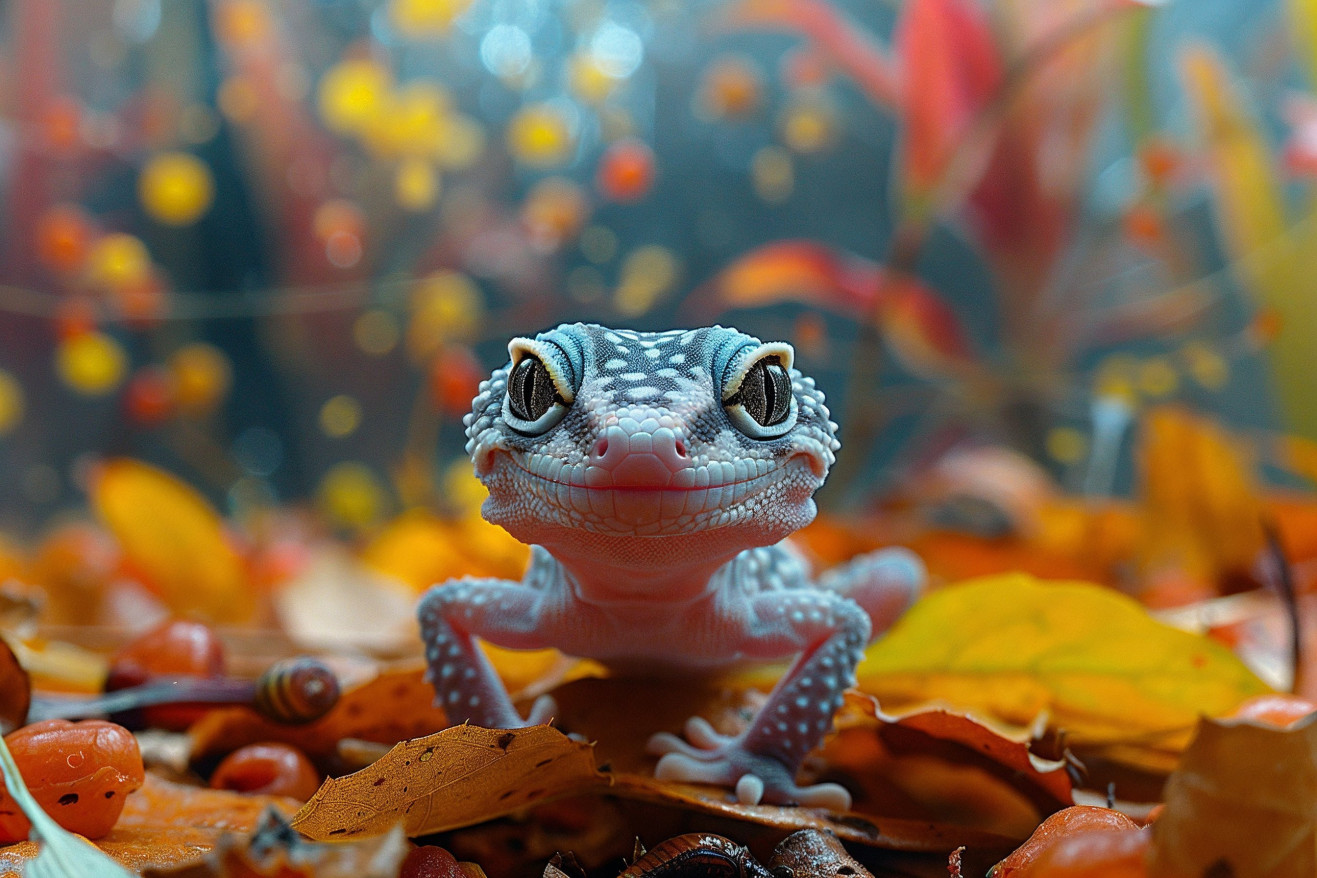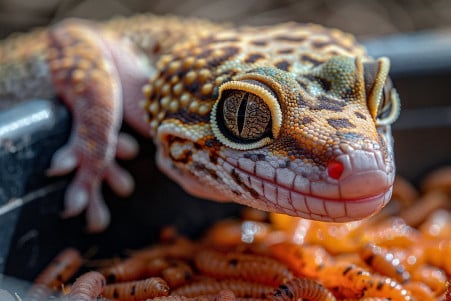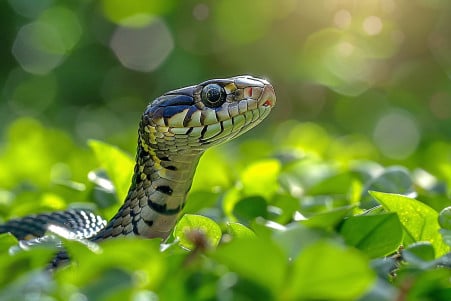How to Feed a Baby Gecko: A Complete Nutritional Guide
29 May 2024 • Updated 27 May 2024

From specialized diets to feeding frequencies, ensuring proper nutrition for your baby gecko requires understanding their unique dietary needs. In the wild, baby geckos primarily consume small insects like fruit flies, pinhead crickets, and tiny mealworms. Captive hatchlings require a similar insect-based diet supplemented with calcium and vitamins for healthy growth and development.
By delving into the studies of herpetologists and seasoned reptile experts, we'll learn the best ways to feed and the nutritional needs that will help ensure the health of baby geckos in captivity.
What do baby geckos eat?
Feeding Frequency and Portion Control
Feeding baby leopard geckos can be a bit more involved than feeding adults, and it's important to get it right to make sure your pet grows up healthy and strong. Leopard Gecko Care recommends feeding baby and juvenile leopard geckos every day, while adults can be fed every other day due to their slower metabolisms. Meanwhile, Reptile Guide says that a good rule of thumb is to feed your gecko one appropriately-sized insect for every inch of its body length, or as many insects as it will eat in 15 minutes.
Insect size is also important, and PetMD says that insects should be no wider than the space between your gecko's eyes. Hatchlings can be fed insects that are about ⅜ inch long, juveniles can be fed ¼ inch insects, and adults can be fed ½ to ¾ inch insects. It's important to keep an eye on your gecko's portion sizes and adjust them as needed based on their appetite and growth rate. Leopard Gecko Care recommends starting with 8 to 10 small insects per feeding and adjusting from there.
It's also a good idea to gut-load your feeder insects with high-calcium foods to make sure your leopard gecko is getting the nutrients they need. As PetMD notes, feeder insects should be fed a diet that's fortified with calcium and vitamins before being fed to your gecko, and they should be lightly dusted with calcium and vitamin supplements on a regular basis. This will help make sure that your gecko is getting the nutrients they need to grow up healthy.
Nutritious Insects to Feed Baby Geckos
A variety of insects can be a nutritious part of a baby gecko’s diet, including dubia roaches, crickets, mealworms, and waxworms. PetMD notes that these insects can be part of a balanced diet if they are gut-loaded with the right supplements.
Reptile Supply says that dubia roaches have the most nutrition per individual insect when compared to superworms and crickets, so they are a great staple feeder. Superworms are also a good staple because they have a good protein-to-calcium ratio. On the other hand, mealworms have a lot of chitin, which can be hard for geckos to digest and can lead to impaction.
To ensure that your gecko gets a good mix of nutrients, ABDRAGONS suggests feeding them a variety of insects. This can include silkworms, hornworms, and black soldier fly larvae (also known as NutriGrubs), which are high in calcium. However, ReptiFiles warns that waxworms should be fed sparingly because they are high in fat and can lead to obesity if they are the only staple in a gecko’s diet.
It’s important to make sure that the insects you feed your gecko are gut-loaded with high-calcium, vitamin-rich foods, as PetMD points out, so that your baby gecko gets the right balance of nutrients for healthy growth and development.
How to Transition to a Solid Insect Diet and Promote Healthy Eating Behaviors
It will take time and close observation to transition baby geckos from a diet of liquid or soft foods to one that is based on solid insects. According to Zen Habitats, leopard geckos should be fed a diverse diet of live insects, such as crickets, dubia roaches, mealworms, and other nutritious options.
To promote healthy eating behaviors, it's important to offer a variety of different sizes and types of insects and use feeding tongs to present the prey. As Zen Habitats explains, this will help the geckos build a strong prey drive and prevent them from becoming picky eaters. It's also important to make sure the feeding area is free from stressors like loud noises and handling.
Learning to recognize signs of a healthy appetite, such as a gecko eagerly striking and consuming insects, can help you make changes to the feeding schedule. Zen Habitats suggests starting with 2 appropriately-sized insects per inch of the gecko's length, or as much as they can eat in 15 minutes, and adjusting as needed based on the gecko's size and appetite. It will take time and consistency to successfully establish a solid insect-based diet and healthy feeding habits for baby geckos.
Ideal Enclosure Conditions for Baby Geckos
One of the most important factors in the health and well-being of baby geckos is the enclosure in which they are kept. According to Leopard Gecko Care, the enclosure should be the right size, with a 10-gallon tank being the smallest size for a single gecko, although a 20-gallon tank is better. The enclosure should also have a temperature gradient, with a warm basking area of 88-94°F and a cool side of 70-80°F, according to Geckos Unlimited.
Babies need at least two hiding spots, one on the warm side directly over the heat source and one on the cool side, and a moist hide to help with shedding, according to Terrarium Quest. The humidity in the enclosure should be kept between 30-40%, and a shallow water dish should be provided, according to the RSPCA.
In terms of substrate, loose substrates like sand should be avoided because they can cause impaction, and instead, you should use something like tiles, slate, or vinyl, according to Leopard Gecko Care. Good lighting, including low-level UVB, is also important for the overall health and well-being of baby geckos, according to the RSPCA. By ensuring that you have the right enclosure conditions, you can help your baby geckos stay healthy and grow.
How to Spot and Deal With Common Health Problems in Baby Geckos
Keeping an eye out for signs of illness or health problems is important for baby geckos, according to ReptiFiles. Reptiles that are sick or weak in the wild are more likely to be eaten by predators, so they have evolved to hide signs of illness. This means that as pets, it's important for owners to be vigilant about noticing any changes that could be a sign of a health problem.
ReptiFiles suggests weekly weighing and keeping a log of the weights to help you notice any sudden changes. Some of the most common health problems to look out for include impaction, metabolic bone disease (MBD), parasites, and respiratory infections. Impaction, which occurs when a gecko swallows something that can't be digested, can be fatal if it's not treated, according to My Family Vets. MBD, which is caused by a lack of calcium and vitamin D3, results in soft, misshapen bones, according to Gecko Time.
Parasites and respiratory infections are also common concerns, and they can cause symptoms like tiredness, loss of appetite, and difficulty breathing, according to My Family Vets. While things like proper nutrition and habitat care can help prevent these issues, if your baby gecko is showing signs of a health problem, especially if they're severe or ongoing, it's important to get help from a reptile vet, according to My Family Vets.
Conclusion: How to Feed and Care for Baby Geckos
Raising baby geckos demands a comprehensive knowledge of their specific dietary requirements. In this article, we've covered the best practices for feeding and the nutritional needs that will help ensure the health and happiness of baby geckos in captivity.
In summary, it's important to feed baby geckos on a regular schedule, make sure the insects you feed them are the right size, and provide a diverse, nutritious diet that includes calcium and vitamin supplements. Equally important is the need to wean baby geckos off of a liquid diet and onto a solid diet of insects and to make sure they are eating well.
In addition to diet, it's important to make sure that the baby gecko's habitat is set up properly, with the right temperature, humidity, and hiding places. It's also important to watch for signs of common health problems and take steps to prevent them so that your baby gecko can grow up to be a strong, healthy adult.
While raising baby geckos may require extra effort, the satisfaction of seeing them through their growth and development makes it all worthwhile. If you have any questions or need help, don't hesitate to reach out to reptile experts or veterinarians for advice.


